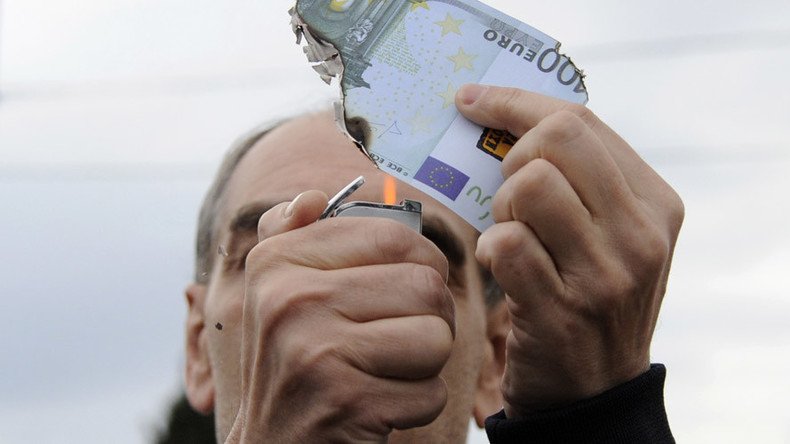Greek parliament pushes through more austerity measures to unlock bailout cash

In the midst of huge public protests, Athens has approved more budget cuts, tax increases and a new privatization fund to manage almost all state property in order to get further rescue loans from European creditors.
The government hopes to incorporate an extra €1.8 billion in revenue and get the next tranche of much-needed bailout funds to pay IMF loans, bonds held by the ECB coming due in July, and decreasing state debt.
Greece's European creditors are expected to disburse €11 billion ($12.3 billion) following an assessment of the country's third bailout program. Under the terms of the bailout deal agreed last year, the international lenders will provide as much as €86 billion in aid.
“Greeks have already paid a lot, but this is probably the first time the possibility of these sacrifices being the last is so evident,” said Prime Minister Alexis Tsipras to Parliament before the vote. The PM expects the country’s economy to grow three percent next year.
The reforms involve new taxes on alcohol, tobacco, fuel, internet usage, cars, hotel stays, as well as an increase in the basic value-added tax rate from 23 to 24 percent.
#Greece's 2y yields drop more than 100bps after austerity vote. pic.twitter.com/ZoXXePT06L
— Holger Zschaepitz (@Schuldensuehner) May 23, 2016
The measures also aim to free up the sale of non-performing loans owned by Greek banks and to establish a privatization fund controlling the country’s assets. The fund, controlled by the country's creditors, is expected to ease the sale of public companies.
Demonstrations in #Syntagma Square in Protest of the omnibus bill related to Austerity Measures #Athens#Greecepic.twitter.com/U5ROOaeLKu
— DimitrisLampropoulos (@LampDim) May 22, 2016
The bill was supported by 153 members of the Syriza-coalition with 145 MPs voting against. The step came ahead of a Eurogroup meeting on Tuesday that is expected to unlock another tranche of money for debt-ridden Greece.
As austerity debate nears end, a homeless man walks through an underpass, holding bottle of wine #Greecepic.twitter.com/wdDrH8vyhj
— Derek Gatopoulos (@dgatopoulos) May 22, 2016
Under its current deal with the European Union, Athens is to bring in a primary budget surplus to 3.5 percent of gross domestic product (GDP) by 2018.
Earlier this month, the Greek parliament passed reforms of the pension and income tax systems to save Athens another €3.6 billion.
Hundreds took to the streets in Athens against new austerity bill https://t.co/vg16sKAFJShttps://t.co/y5xayWB9K8
— Ruptly (@Ruptly) May 23, 2016
The unpopular reforms have resulted in protests across the country. Thousands gathered outside the parliament building in Athens on Sunday to rally against the measures. Transport workers staged a 48-hour-strike in protest of the new tax hikes.













